语篇层次的翻译
语篇翻译——衔接与连贯

Chapter 7 语篇翻译——衔接与连贯语篇通常指一系列连续的语段或句子构成的语言整体。
它可以是独白、对话,也可以是众人交谈;可以说文字标志,也可以是诗歌、小说。
它可以是讲话,也可以是文章;短者一两句可成篇,长者可洋洋万言以上。
所以,可以说,无论是一句问候、一次谈话、一场论文答辩、一次记者招待会的问答,还是一张便条、一封书信、一份科研报告、一本文稿,都可以是语篇。
语篇包括“话语”(discourse)和“篇章”(text)。
衔接与连贯(Cohesion vs Coherence)衔接体现在语篇的表层结构上,是语篇的有形网络;连贯存在于语篇的底层,是语篇的无形网络。
衔接与连贯密不可分,衔接是实现语篇连贯的一个重要前提,但并不是说,连贯必须要以衔接为前提。
衔接(Cohesion)7.2.1 定义衔接是将语句聚合在一起的语法及词汇手段的统称,是语篇表层的可见语言现象。
. Paris I’ve always wanted to go there.7.2.2 分类衔接手段大致可分为语法衔接手段(grammatical cohesion)和词汇衔接手段(lexical cohesion)两种。
前者包括指称(reference)、替代(substitution)、省略(ellipsis)和关联/连接词(conjunction);(后者指复现(reiteration)和同现(collocation))。
(Halliday & Hason)这些语言手段形成一个有形的完整网络,使篇章的各组成部分有机地衔接起来,从而增强整个篇章的内聚力。
7.2.3英汉语衔接方式的差异1.就语句连接方式来说,英语多用连接词来连接,而汉语则通过意义来连接。
2.在语法方面,英语语法是显性的,而汉语语法则属隐性。
3.对英汉互译的启示。
7.2.4指称/照应(reference)指称是指一个语言成分与另一语言成分产生关联。
. Tommy likes ice-cream and he has always an appetite for it..Whenever he saw an ice cream, Tommy would like to taste it.. Proverbs are heirlooms, treasured and passed on from generation to generation. We assume these pithy phrases sum up timeless wisdom. But are the truisms really true Psychologists have found they’re pretty hit-or-miss. Still, they persist. After all, you know what they say: old habits—and old sayings—die hard.. The patient shook her head and stretched out her hands towards the baby. The doctor put it in her arms. She kissed it on the forehead.“But if a woman is partial to a man, and does not endeavor to conceal it, he must find it out.”“Perhaps he must, if he sees enough of her.”---Jane Austen: Pride and prejudice7.2.5 省略(ellipsis)省略是用词项空缺的方式达到上下文衔接的目的。
语篇的翻译
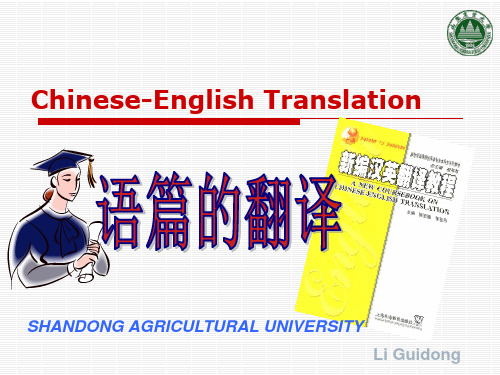
SHANDONG AGRICULTURAL UNIVERSITY
15
语篇的翻译
2. 主位-述位结构
汉英两种语言在主位-述位结构上的主要 差异主要表现在汉语为主题突出型 (topic-prominent)的语言,而英 语则为主语突出型(subjectprominent)的语言。
SHANDONG AGRICULTURAL UNIVERSITY
9
语篇的翻译
The Gateway Arch at the edge of the Mississippi River in St. Louis is the world’s tallest monument. Eero Saarinen designed the stainless steel structure that commemorates the Westward Movement.
SHANDONG AGRICULTURAL UNIVERSITY
14
语篇的翻译
2. 主位-述位结构
见富贵而生谄容者最可耻, 遇贫穷而作骄恣者贱莫甚。
He who grows sycophantic before people of wealth and position is most degrading. He who waxes haughty in front of the poor is far too despicable.
英汉思维差异在语篇层次上的翻译策略

英汉思维差异在语篇层次上的翻译策略作者:乔淑霞来源:《考试周刊》2013年第36期摘要:思维和语言紧密相关。
英民族和汉民族的思维方式不同,英汉在篇章的结构安排上有很大差异。
因此,在英汉语篇的互译过程中,必须采取必要的调整手段,使之符合译入语的表达习惯。
关键词:思维差异语篇层次翻译策略一、引言对于思维在翻译中的作用,Peter Newmark[1]就曾指出,从思维、意义、语言的关系研究翻译是翻译研究的趋势之一。
语言是思维的外在表现形式,也是思维的工具。
在一切的语言活动中,思维必定参与其中。
在翻译活动中,译者要涉及两种语言,译者的思维需要在两种语言中频繁切换。
因此,有学者提出“翻译是译语的再思维”[2]。
但是思维具有民族性,即各个民族的文化背景不同,其思维方式必然存在与其他民族不同的地方,继而产生语言形式上的差异,形成不同民族之间交往的障碍,给翻译实践带来许多困难,但从语篇层次上就思维差异对翻译的影响和策略的研究还略显不足。
本文从英汉语言形式所折射的思维差异入手,探索英汉语篇互译的恰当策略。
二、思维差异在语篇层次上的翻译策略思维的差异势必会导致英汉民族在语篇层次上形成不同的语篇结构。
所谓语篇结构,是某一特定文化中组句成篇的特定方式,是一种约定俗成的、相对稳定的语言使用习惯,是文化因素在语言运用过程中长期积淀的结果。
在进行翻译活动时,唯一能作用于翻译主体和客体的就是思维。
思维是语言转换的基础,这就决定了英汉语篇的互译必然受到思维的限制。
因此,鉴于思维差异,在英汉语篇翻译实践中应做出如下调整。
(一)调整语篇切入点汉民族重曲线思维,汉语语篇的往往开头不会直抒胸臆,而是先进行一定的论述及铺垫,在语篇中或末尾处表达看法、判断或推论;英民族重直线思维,因此英语语篇往往开门见山,亮出自己的观点。
例如:Aristotle could have avoided the mistake of thinking that women have fewer teeth than man, by the simple device of asking Mrs.Aristotle to keep her mouth open while he counted.这个语篇体现了英民族的思维方式:开篇即点出主题,即亚里士多德本来可以避免这样的错误,接着说明他的错误想法是什么,最后提出避免其错误想法的方法。
Chapter 4 翻译单位与语篇翻译

12) If I learn to drive a motorcycle, I will certainly buy a new one. 我要是学摩托车的话,(我)就一定去买一辆新的。
Why did you set the wolf to keep the sheep? 10) 他是信口开河,他对经济一窍不通。
He is shooting off his mouth. He does not know the first thing of economy.
The Omission of Pronoun
【译文】美国和中国有着共同的利益,当然也 有分歧,不过我们相信我们能够以相互了解和 尊重的态度来探讨所存在的分歧。
【解析】由于谈的是中美两国的重大国际关系 问题,译文用了“当然”“不过”使语篇意义 完整,措辞显得婉转,语气平和友好。
15
例3:An efficient computer code for calculating the
故事就发生在丹麦的一家雅致的小旅馆里。这种 小旅馆备有酒食招待游客,而且讲英语。
Examples of Translation from English to Chinese: 1) I took the news with a grain of salt.
我对这个消息半信半疑。 2) He went through fire and flood to save his
13) in deep water
水深火热
14) turn up one’s nose at
第14单元 商务信函类语篇的翻译
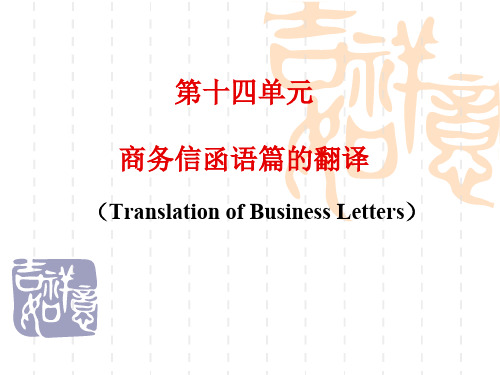
二、Classification of business letters
通常会有以下两种分类方式:
(一)以信息功能为主
1. 建立业务关系函(cooperation intention) 介绍己方如何获得对方公司的信息,并表达与对方建立业务的愿
望。语言言简意赅、情真意切、礼貌得体,以留下深刻印象,为合 作打好基础。 2. 产品推销函(promotion)
第十四单元 商务信函语篇的翻译
(Translation of Business Letters)
一、Definition of business letters
商务信函(business letters)是商务活 动中书面交流信息的主要手段之一,是商业 贸易往来所使用的通信形式。是企业对外公 共宣传关系中重要的手段,对于树立良好的 公司形象有着极为重要的意义。
三
遵循“忠实、通 注意信函结构 顺”的翻译标准 化程式化的翻
译
运用套译的 翻译方法
四
商业信函翻 译实例分析
(一)遵循“忠实、通顺”的翻译标准
首先,应当准确、忠实地再现原文信函的思想内容及风格 特征。准确达意、简洁明了是英文商务信函的基本特征,因此, 合格的译文也理应具备这些特征。例如:“offer”我们可以翻译 Se为c 1“提供、建议”,但在特定的书信中,“offer”则只能翻译为 “要约(要约是当事人一方向对方发出的希望与对方订立合同 Se的c 2意思表示。发出要约的一方称要约人,接收要约的一方称受 要约人)、发盘(交易的一方为了销售或购买一批商品,向对
Sec 4
方提出有关的交易条件,并表示愿按这些条件达成一笔交易, Se这c 6种意思表示的行为称作发盘)”,相应的“offferer、offeree”
第七章 语篇的翻译 英汉互译课件
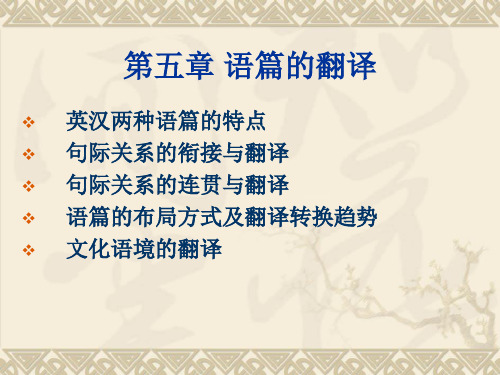
英汉语篇在语法衔接上的具体转换方式: 1)从时体形式上分析。英语的时体作为语篇衔接的语 法手段。 They told me that by the end of the year they would have been working together for thirty-five years. 他们告诉我,到(那年)年底,他们在一起工作就 有35年了。 Roger has finished the thesis. Caroline arrived from New York. 罗杰完成了论文。因为卡罗琳从纽约来到了他身边。
(三)英汉语言逻辑连接的差异和翻译 逻辑连接的差异是语篇内深层次的最普遍的连 接,它是保证语篇的必备条件之一。逻辑连接也有 显性与隐性之分。显性逻辑连接指使用了and、but、 then、 for等联结语的衔接,而隐性逻辑连接则指 那些不使用联结语而靠语用、语境等实现的连接。 就英汉语比较而言,逻辑关系总的来说是英汉相通 的,即时空、因果、转折和表示相类同的推延等基 本的逻辑关系是一致的。但是英汉语的逻辑关系有 时也有差异,如英语的时空关系,汉译时常改为因 果关系,反之亦然。总的说来,由于英汉连接语的 差异和逻辑关系显性与隐性的差异,英汉翻译时, 译者应选择正确的逻辑连接词或语,或隐或显,以 使译文符合译语的表达习惯。
2)从替代关系上分析。所谓替代,指用词语代替前 文的某些词语,但不是指称性的一致关系,而只是具 有同等或类似语义。替代主要有名词替代、动词替代 和分句替代三类。替代在英汉语中都存在,且往往互 相对应。但互不对应难以照译时,需借助其它衔接或 连贯手段。如: A: I’ll have a cup of black coffee with sugar, please. B: Give me the same, please. A: 劳驾,我要一杯加糖的清咖啡。 B: 请给我也来一杯。(试比较:请给我也来同样 的。)
语篇翻译
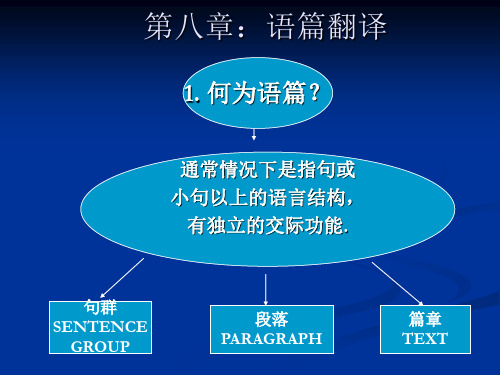
该汉语段落的中心思想就是:历史告诉我 们,只有马克思列宁主义才能救中国。但 这一主题的阐发方式却明显不同于英语论 说文段落模式,它形散神聚,词句的随"意" 自然流动、重文气(气韵)而轻文理(理 则)、乃至断句不严等特点,均可在其中 找到。
It may be that I am a pessimist, for spring it is, not autumn, that makes me sad. Spring has always rightly been identified with youth, and the sorrows of youth are poignant and bitter. The daffodils which challenge so proudly and splendidly the boisterous March winds are soon shriveled and defeated, limply wrinkling to remind us of the inevitable ravages of time. The world is urgent with bursting life, with the wild exciting beauty of youth, but it is an impetuous beauty of scenes racing impatiently in to the florid and surfeited luxury of summer. Here is no comfort and fulfillment, only passionate creation of transitory delight.
情、呼唤功能 2.2.2 广告文本的翻译:商标的翻译;口号的
语篇层翻译transIation on discourse level
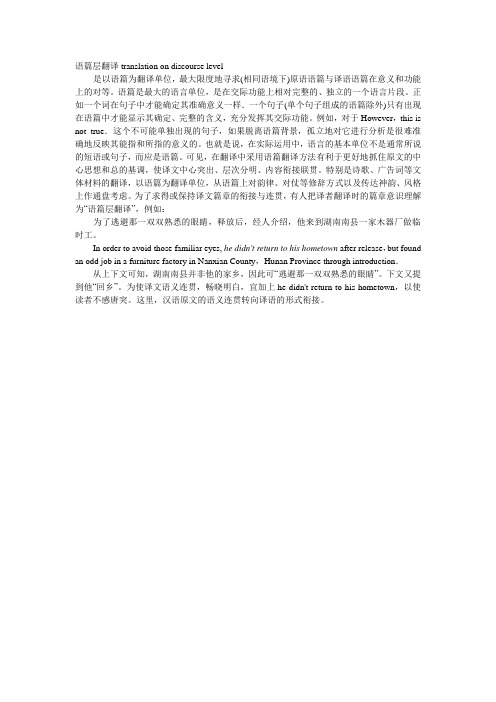
语篇层翻译translation on discourse level是以语篇为翻译单位,最大限度地寻求(相同语境下)原语语篇与译语语篇在意义和功能上的对等。
语篇是最大的语言单位,是在交际功能上相对完整的、独立的一个语言片段。
正如一个词在句子中才能确定其准确意义一样.一个句子(单个句子组成的语篇除外)只有出现在语篇中才能显示其确定、完整的含义,充分发挥其交际功能。
例如,对于However,this is not true.这个不可能单独出现的句子,如果脱离语篇背景,孤立地对它进行分析是很难准确地反映其能指和所指的意义的。
也就是说,在实际运用中,语言的基本单位不是通常所说的短语或句子,而应是语篇。
可见,在翻译中采用语篇翻译方法有利于更好地抓住原文的中心思想和总的基调,使译文中心突出、层次分明、内容衔接联贯。
特别是诗歌、广告词等文体材料的翻译,以语篇为翻译单位,从语篇上对韵律、对仗等修辞方式以及传达神韵、风格上作通盘考虑。
为了求得或保持译文篇章的衔接与连贯,有人把译者翻译时的篇章意识理解为“语篇层翻译”,例如:为了逃避那一双双熟悉的眼睛,释放后,经人介绍,他来到湖南南县一家木器厂做临时工。
In order to avoid those familiar eyes, he didn't return to his hometown after release,but found an odd job in a furniture factory in Nanxian County,Hunan Province through introduction.从上下文可知,湖南南县并非他的家乡,因此可“逃避那一双双熟悉的眼睛”。
下文又提到他“回乡”。
为使译文语义连贯,畅晓明白,宜加上he didn't return to his hometown,以使读者不感唐突。
这里,汉语原文的语义连贯转向译语的形式衔接。
- 1、下载文档前请自行甄别文档内容的完整性,平台不提供额外的编辑、内容补充、找答案等附加服务。
- 2、"仅部分预览"的文档,不可在线预览部分如存在完整性等问题,可反馈申请退款(可完整预览的文档不适用该条件!)。
- 3、如文档侵犯您的权益,请联系客服反馈,我们会尽快为您处理(人工客服工作时间:9:00-18:30)。
• 文化与翻译 • 一、概念意义与文化意义完全相
同。
• 丢脸 to lose face • 老手 an old hand • 灰心 to lose heart • 笑柄 a laughing stock • 浑水摸鱼
• to fish in troubled water • 趁热打铁 • Strike while the iron is hot. • 花钱如流水 • to spend money like water • 祸不单行 • Misfortune never comes alone.
• 他们进行挑衅活动,制造紧 张局势,必须马上停止。
• They must stop all their provocations at once, which created tensions. (因果)
• 1.种瓜得瓜,种豆得豆. • 2. 他不去我也去。 • 3. 他不去我才去。 • 4. 人穷志短。 • 5. 人穷志不短。 • 6. 人有脸, 树有皮。 • 7. 人不犯我,我不犯人。
• The considerable amount of wine Hsin-mei has had was burning inside and made him sick with jealousy.
• 三、概念意义相同,语用意义不同
• (风姐):这通身的气派竟不象老祖宗的外 孙女儿,竟是嫡亲的孙女儿似的。
汉语“竹节”式结构与英语 “葡萄串”式结构
• 汉语: 思维程序的先后顺 序—逐项交代
• 英语: 意义的主次—“主 语—谓语” SV框架
• 忽然想起采莲的事情来。采莲是江南的 旧俗,似乎很早就有,而以六朝为盛; 从诗歌里可以约略知道。
• Then all of a sudden, I was reminded of the custom of plucking lotus seeds, prevalent in Jiangnan, handed down from a very remote period and quite popular during the Six Dynasties, as may be seen roughly in songs and poems that survive.
• .种瓜得瓜,种豆得豆。
• Plant melons and get melons; sow beans and get beans. As a man sows, so he shall reap.
• 2. 他不去我去。 • I’d like to go if he
wouldn’t. • 3. 他不去我也去。 • I’d go there even if he
语篇层次的翻译
语篇层次的翻译——衔接
语篇(discourse)是在交际功能上相对完整 和独立的一个语言片断。为了进行有效的交 际活动,语篇应衔接(cohesion)得当,连 贯性(coherence)好。衔接手段 (cohesive device)是一种谋篇手段,是生 成语篇的重要条件之一,也是译者在翻译过 程中首先要考虑的问题,因为它直接关系到 译文的质量。衔接自然的译文读起来通顺、 流畅、连贯;缺乏衔接或衔接不当的译文晦 涩难懂,影响阅读,也影响交际功能的实现。
• Poor but with lofty ideas.
• 7. 人有脸, 树有皮。
• The face is as important to a man as the bark to a tree.
• 8. 人不犯nless we are attacked.
wouldn’t go with me. • 4. 他不去我才去。 • I’d go there only if he
• 5. 人穷志短。
• When a man is poor his ambition is not far reaching.
• 6. 人穷志不短。
• Though he is poor, he has high aspirations.
从语篇层面上说,英汉两种语言在形合 (hypotaxis)和意合(parataxis)方面的差异。
由于英汉两种语言逻辑思维的不同,英语重“形 合”,句子内部的连接或句子间的连接采用显性的语 言手段来实现,主要是通过各种语法手段和词汇手段, 以表示其结构和逻辑关系。因此,英语中长句多。汉 语重“意合”,句中各成分之间或句子之间的结合少 用甚至不用形式衔接手段,主要靠句子内部的隐性逻 辑联系,注重逻辑事理的顺序以及意义和主旨上的衔 接和连贯。因此,汉语中短句多,短句间的逻辑关系 靠意义来表达,语法处于次要地位。在翻译过程中, 要牢记英汉两种语言在形合和意合上的差别,注意形 合和意合之间的转换和调整。
• 二、概念意义对应,文化意义空缺。 • 胸有成竹
• to have a well-thought-out plan in one’s mind
• 水中捞月
• to fish in the air
• (赵辛楣)一肚皮的酒,几乎全化成酸 醋. . . . . .
• The wine in Hsin-mei’s stomach turned to sour vinegar.
• 汉语: 意合 parataxis
•
语义关系—隐含状态
•
“节”与“节”之间
形式 上呈并列关系
• 英语: 形合 hypotaxis
•
语义关系—显现状态
• 这些都应该向他们去进行教 育,加以纠正,而不是简单 地去加以斥责。
• These mistakes should be corrected by educating them and not simply by dressing them down.(方式)
